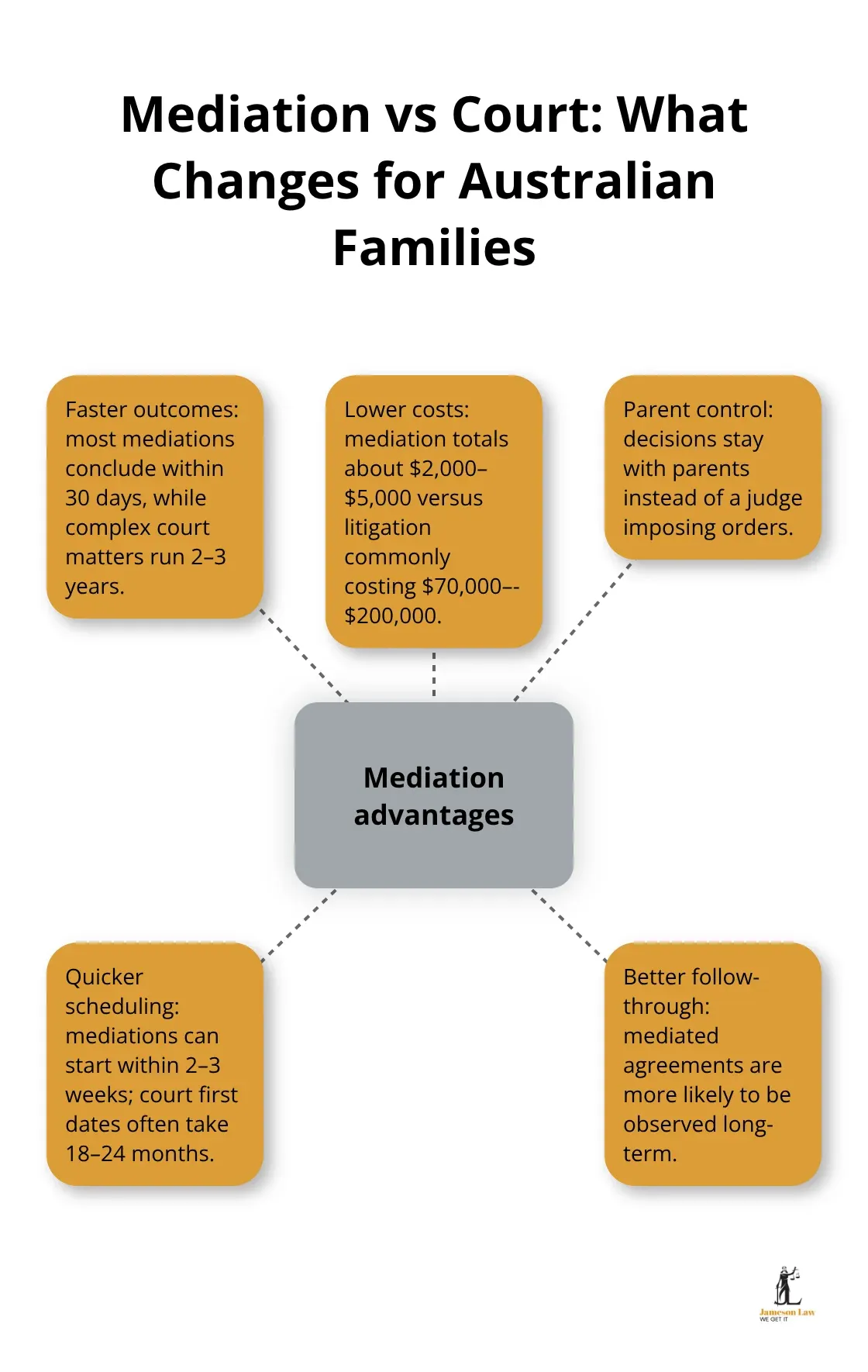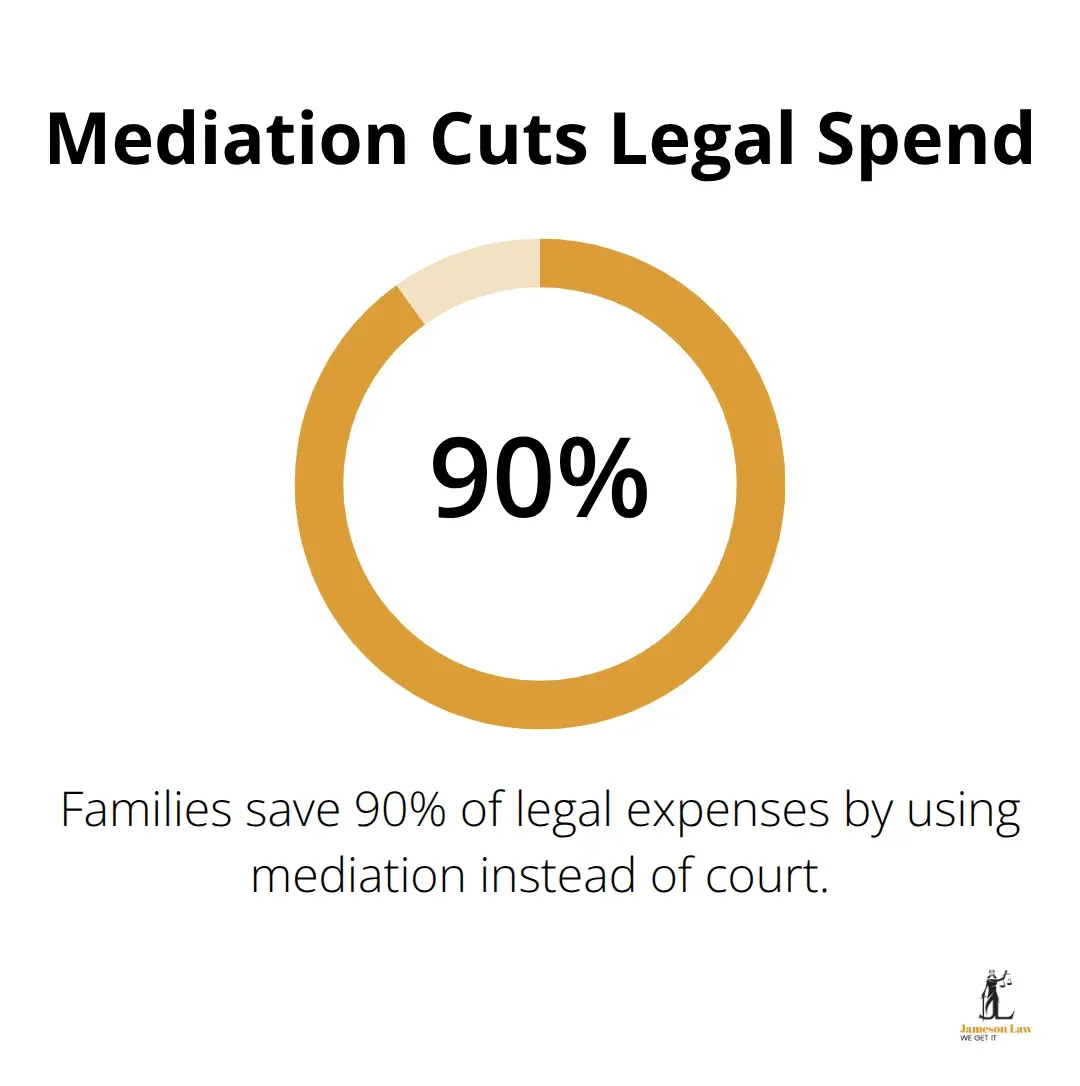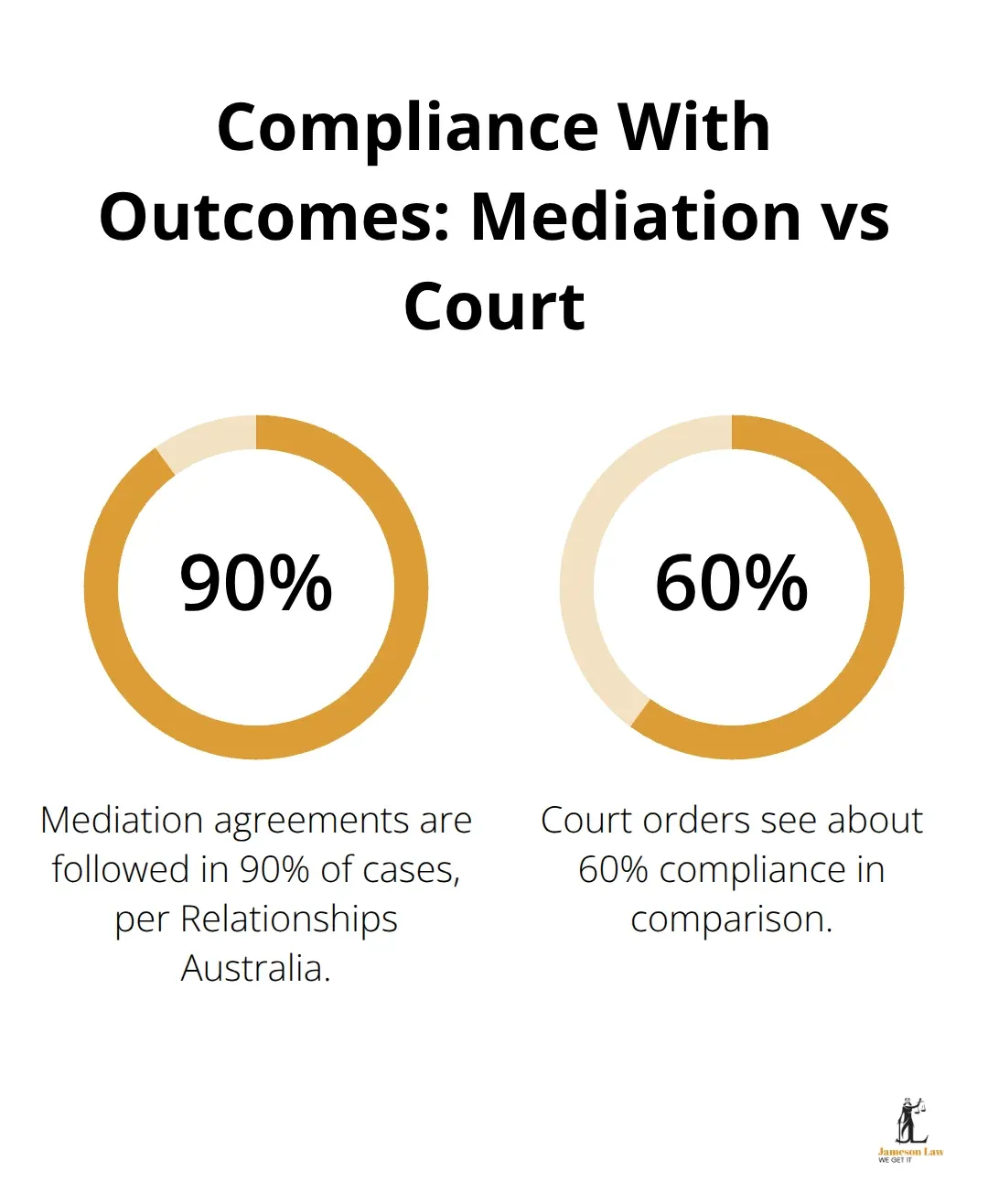Family disputes can tear relationships apart and drain your finances through lengthy court battles. Many families don’t realise there’s a better path forward.
What is mediation family law? It’s a collaborative process where a neutral third party helps families resolve conflicts outside the courtroom. We at Jameson Law have seen how this approach transforms bitter disputes into workable solutions that protect everyone involved.
How Does Family Law Mediation Actually Work
Family law mediation operates as a structured negotiation where an accredited Family Dispute Resolution Practitioner helps separated parents reach agreements about children and property without court intervention. The Family Law Act 1975 requires parents to attempt Family Dispute Resolution before they seek parenting orders, which makes this process mandatory in most cases. Research from the Federal Circuit and Family Court shows families can benefit from mediation, avoiding the average $70,000 to $200,000 cost of litigation.
The Mediator’s Professional Framework
Accredited mediators must register with the Commonwealth Attorney-General’s Department and complete specialised training in family violence screening and conflict resolution. These practitioners remain completely neutral throughout the process – they never give legal advice or make decisions for families. Instead, they facilitate communication between parties who often struggle to discuss sensitive topics like custody arrangements or asset division. The mediator’s role focuses on how they help families identify shared priorities (particularly children’s wellbeing) while they explore practical solutions that work for everyone involved.
Court Proceedings vs Mediation Reality
Court litigation can take 2-3 years for complex cases to reach resolution, while mediation sessions conclude within 30 days of the start of the process. Legal fees in family court range from $350 to $800 per hour, plus additional costs for barristers, expert witnesses, and court fees.
Mediation costs between $2,000 and $5,000 total, which represents massive savings for families. More importantly, court decisions remove control from parents entirely – a judge who doesn’t know your family makes orders about your children’s future. Mediation keeps decision-makers with parents, which results in agreements families actually follow long-term rather than constantly return to court for variations.

What Happens in Mediation Sessions
Sessions can vary in length from a few hours to several days, which depends on the complexity of issues families face. The process can occur remotely (which promotes accessibility for those in regional or remote areas) or in person at community centres or private offices. Confidentiality provisions protect discussions during mediation, with limited exceptions for child abuse disclosures. If parents cannot reach agreement, practitioners issue a Section 60I certificate that allows parties to approach family law courts for resolution.
How Does the Mediation Process Work
Proper preparation determines mediation success, and families who skip this step waste time and money. You must gather financial documents, property valuations, and children’s school records before your first session. The Family Law Act requires you to complete a pre-mediation assessment where practitioners screen for family violence and power imbalances that could make mediation unsafe. Your mediator will provide a checklist of required documents, which typically includes tax returns, bank statements, superannuation details, and parental proposals. Missing documents force rescheduled sessions, which costs additional fees and delays resolution.
Sessions Follow a Structured Format
Mediation sessions begin with ground rules that prohibit interruptions, personal attacks, and discussion of past relationship failures. The mediator guides conversations toward practical solutions rather than emotional grievances. Shuttle mediation allows separated parents to avoid direct confrontation by meeting in separate rooms while the mediator moves between them. Sessions typically last 3-6 hours with breaks every 90 minutes to prevent decision fatigue. Most family disputes can be resolved through mediation in 1-3 sessions when they focus on children’s needs rather than blame. Child-inclusive mediation involves children aged 10 and older in age-appropriate discussions about living arrangements (which research from Relationships Australia shows improves long-term compliance with agreements).
Legal Documentation Makes Agreements Enforceable
Verbal agreements from mediation sessions have zero legal value and cannot be enforced if one parent changes their mind later. Successful mediation produces either Parenting Plans (informal agreements) or Consent Orders (court-registered agreements). Parenting Plans must be written, dated, and signed by both parents but remain unenforceable if disputes arise later. Consent Orders require a family lawyer to draft the agreement and file it with the Family Court, which makes them legally binding and enforceable. Most family lawyers recommend Consent Orders for all property settlements and parental arrangements because they provide certainty and protection. The cost difference between documentation types is minimal compared to returning to mediation or court when informal agreements fail.
These documented agreements set the foundation for long-term family stability, but the real value of mediation extends far beyond just reaching an agreement.
Why Mediation Saves Money and Time
Financial Reality of Family Law Disputes
Court litigation devastates family finances with legal fees that average $350 to $800 per hour for family lawyers, plus additional costs for barristers, expert witnesses, and court fees. The Federal Circuit and Family Court data shows litigation costs can reach significant amounts for complex property settlements. Mediation costs between $2,000 and $5,000 total, which means families save 90% of their legal expenses.

These savings protect your property pool from consumption by legal fees and leave more assets for your family’s future needs.
Speed Advantage Over Court Proceedings
Court litigation takes extended periods to reach a decision, while mediation resolves disputes within 30 days. Court backlogs force families to wait 18-24 months just for their first date. Mediation sessions can be scheduled within 2-3 weeks of initial contact with a practitioner. This speed matters because prolonged disputes damage children’s emotional wellbeing and prevent families from movement forward with their lives.
Control Your Family’s Future
Court proceedings strip parents of decision-makers power – a judge who never met your children makes orders about their arrangements and your property division. Mediation keeps control with families who understand their unique circumstances. Research from Relationships Australia shows agreements reached through mediation have 90% compliance rates compared to 60% for court orders. Families who mediate report higher satisfaction with outcomes because they actively participated in creation of solutions rather than had decisions imposed on them.

This control extends to flexibility (both in terms of schedule and privacy protection) and the ability to modify agreements as family needs change over time.
Emotional Benefits Beyond Financial Savings
Mediation reduces the mental and emotional strain compared to court processes, which often extend for years and create additional stress. The collaborative nature of mediation promotes better communication between parties and fosters a respectful environment that proves essential for families with children. Studies indicate that agreements reached through mediation are more likely to be adhered to over time compared to court-ordered decisions because parties feel more empowered through their active role in determination of outcomes.
Final Thoughts
Mediation works best when both parents prioritise their children’s wellbeing over past grievances and approach discussions with genuine willingness to compromise. The process proves most effective for families who can communicate respectfully, even during conflict, and when no family violence or significant power imbalances exist. Parents who prepare thoroughly with required financial documents and realistic expectations achieve faster resolutions.
You can start by contacting an accredited Family Dispute Resolution Practitioner registered with the Commonwealth Attorney-General’s Department. Community Legal Centres, Legal Aid offices, and Family Relationship Centres provide free or low-cost mediation services based on eligibility. Private practitioners offer more flexible schedules but charge higher fees.
What is mediation family law success depends on professional legal support throughout the process (which protects your interests from start to finish). We at Jameson Law help families prepare for mediation sessions, review proposed agreements, and draft enforceable Consent Orders. Our experienced family lawyers work alongside mediators to achieve outcomes that serve your family’s unique needs while avoiding costly court battles that drain your resources and emotional energy.













